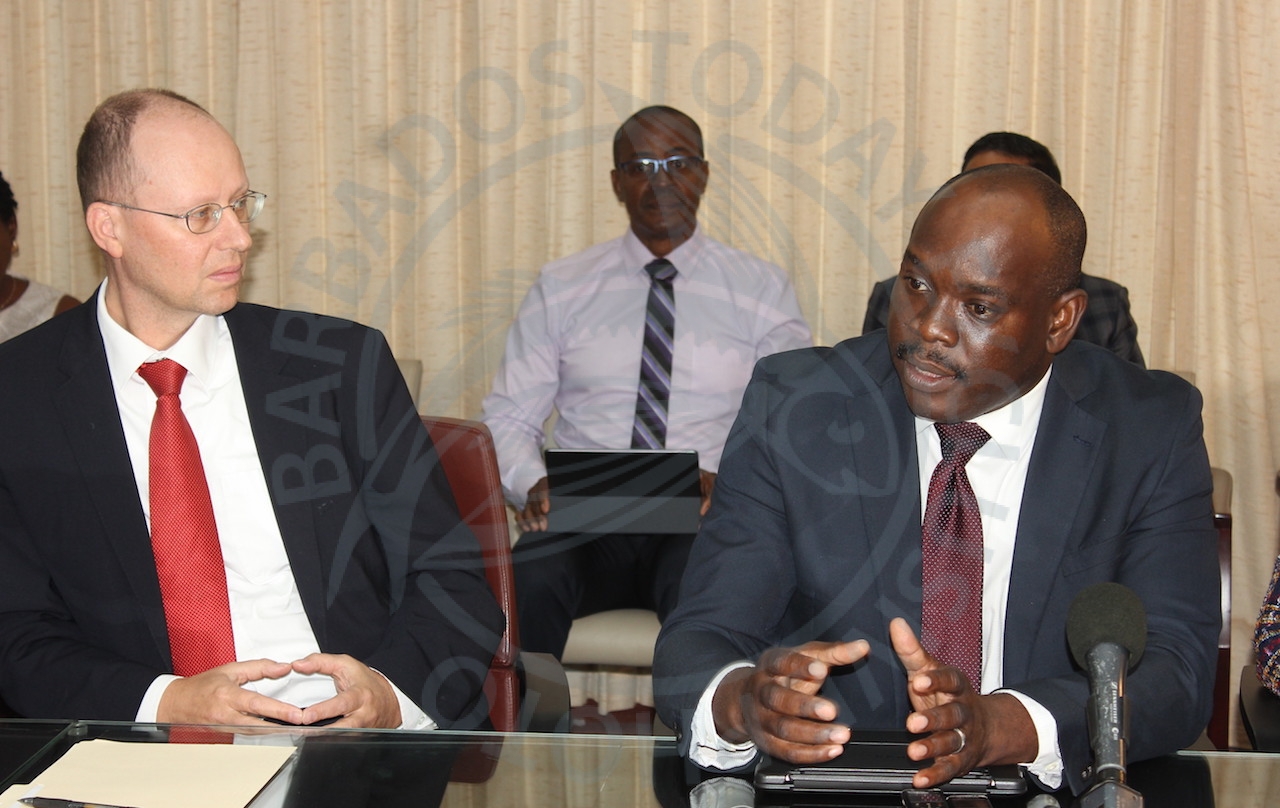As Government continues to make “good progress” in implementing its economic reform programme, residents are being promised that social transformation is not being ignored.
This assurance has come from Minister in the Ministry of Finance Ryan Straughn, who said Government was aware that crime and violence had the potential to threaten economic gains.
“As it relates to crime, all that we are doing in terms of the macro economy essentially can all go to naught if we don’t get a stronger hand on the crime situation,” said Straughn, who pointed out that a number of programmes were taking place to address the problem at various levels.

IMF’s Deputy Division Chief for the Caribbean Bert Van Selm (left) and Minister in the Ministry of Finance Ryan Straughn.
He said Government was aware of the need to ensure social issues were adequately addressed even as strong focus was being placed on improving the macroeconomic climate.
“We remain committed to not just looking at the macro picture, but essentially ensuring that the implementation of the reforms actually reach the people as quickly as we can allow that to happen,” he said.
His comments came on Friday during a media conference at the Central Bank, where the International Monetary Fund (IMF) Deputy Division Chief for the Caribbean Bert Van Selm reported that Barbados had met all its targets under the second review of its ambitious Barbados Economic Recovery and Transformation (BERT) programme.
“All programme targets for end of September 2019 under the Extended Fund Facility (EFF) have been met,” said Van Selm.
The IMF is providing funding of US$290 million under the facility arrangement in support of the four-year BERT programme.
Van Selm said following productive discussions, the IMF team and the Barbadian authorities reached staff-level agreement on the completion of the second review under the EFF arrangement, which was subject to approval by the IMF Executive Board, which is expected to consider the review in December.
Upon completion of the review Barbados will receive a drawdown of about US$48 million.
Singling out several areas of achievement, Van Selm expressed satisfaction with the increased international reserves and lowering of the debt to gross domestic product (GDP) from around 175 per cent a year ago to 118 per cent.
He also pointed out that the target for primary surplus was met by a “comfortable margin”, which boded well for Government’s six per cent primary surplus target by the end of March next year.
He further pointed out that the debt restructuring deal reached between Government and the external creditors last month would further reduce the country’s debt and uncertainty and improve investment prospects.
“The terms of the new instrument will help Barbados reach its medium-term target of 80 per cent debt to GDP by 2027/2028, and 60 per cent by 2033/2034,” he said.
He said he was expecting the island’s credit ratings to improve once the deal with external creditors was completed at the end of this year.
“That sort of sends a signal to the whole investment community out there, whether it be foreign direct investment or people interested in buying debt instruments, that Barbados is doing better and is truly open for business. So we think this will mark a very important moment,” said Van Selm.
The economist warned that reducing transfers to state-owned entities was key for sustainable fiscal consolidation, pointing out that transfers had become a significant burden on the budget and a “major contributor to fiscal risks”.
Under the BERT programme, grants to state enterprises are targeted to decline to under six per cent of GDP by financial year 2021/2022.
He pointed to the need for the Central Bank to be equipped with tools and facilities to be able to manage liquidity consistent with the exchange rate peg.
“A new Central Bank of Barbados law will clarify the mandate of the central bank, enhance the decision-making structures of the central bank and introduce safeguards to protect the institutional and functional autonomy of the central bank,” he said, adding that work in that regard was “well underway”.
The IMF official further stated that structural reform was necessary to “unlock” Barbados’ growth potential.
He acknowledged that work had already started to address challenges related to the business climate, but warned of the need to improve resilience to natural disasters and climate change, adding that this would help to strengthen the outlook.
Again calling on Barbadians to “stay the course”, Minister Straughn said Government was committed to the BERT programme and that the reforms were implemented in such a manner that the growth and recovery that are to come will be as inclusive as possible.
Stressing that the social interventions were just as important as the economic, the Government Minister said creating job opportunities for young people was a very important element to the island’s transformation.
Pointing to a number of structural reforms that were taking place including an upgrade of the Barbados Port’s systems and digitization of Government, Straughn said during the reform process, Government was creating the space for the private sector to conduct business with greater ease and create jobs in the process.
The Minister is also expecting more investment following the conclusion of the debt restructuring deal reached with external creditors. He pointed out that the debt service interest rate for Government had peaked at almost 13 per cent.
“With the debt restructuring that will be reduced significantly to 6.5 per cent. And the reality is that the downgrades we experienced over the last few years created a significant increase in cost for capital to any company that wanted to undertake investment in Barbados
“Our ability to conclude this external debt solution will create the space for a new level of financing for projects in Barbados. Confidence within the investor community will be enhanced and as a result, what we will see then going forward is greater improvement with respect to the foreign direct investment in the country,” Straughn explained.
marlonmadden@barbadostoday.bb



